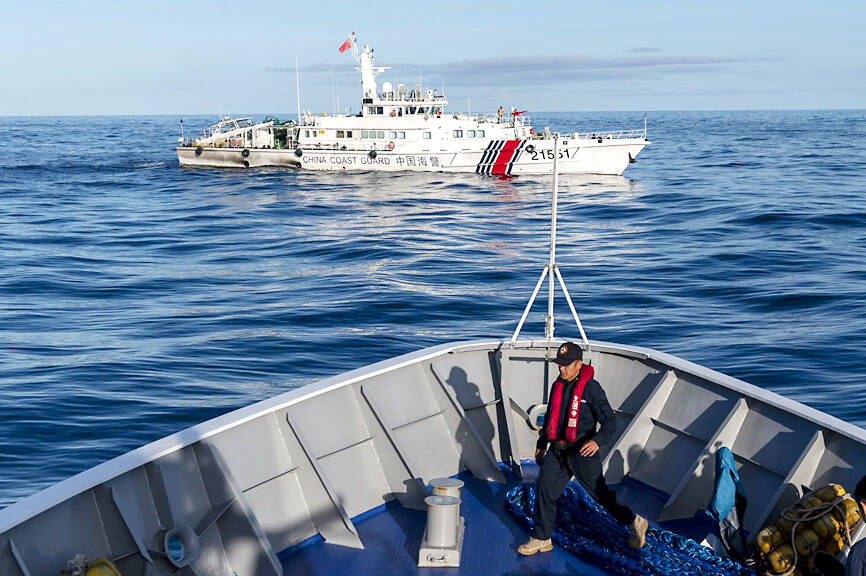The Philippines has approached neighbors such as Malaysia and Vietnam to discuss a separate code of conduct regarding the South China Sea, its president said yesterday, citing limited progress toward striking a broader regional pact with China.
Relations between the two have grown more tense under Philippine President Ferdinand Marcos Jr, who has increasingly complained about China’s “aggressive” behavior while rekindling strong ties with the Philippines’ sole treaty ally, the US.
Speaking in Hawaii at a livestreamed event, Marcos said that escalating tension in the South China Sea required the Philippines to partner with allies and neighbors to maintain peace in the busy waterway, where the situation had become “more dire than it was before.”

Photo: Bloomberg
He said that China’s military had “started to show interest” in building bases on reefs that were “closer and closer to the Philippine coastline.”
“As I have said before and I will say again, the Philippines will not give up a single square inch of our territory to any foreign power,” Marcos said.
He said that ASEAN members were still waiting on a code of conduct with China, “and the progress has been rather slow unfortunately.”
“We have taken the initiative to approach those other countries around ASEAN with whom we have existing territorial conflicts, Vietnam being one of them, Malaysia being another and to make our own code of conduct,” he said. “Hopefully this will grow further and extend to other ASEAN countries.”
The embassies of China, Malaysia and Vietnam in Manila did not immediately respond to a request for comment on a possible code.
China said that formulating a code of conduct in the South China Sea was an important task for it and ASEAN countries.
However, a spokesperson for the Chinese Ministry of Foreign Affairs told a regular news briefing that “any move that deviates from the framework and runs counter to the spirit of the declaration on the conduct of parties in the South China Sea is null and void.”
Additional reporting by AFP

Taiwan is gearing up to celebrate the New Year at events across the country, headlined by the annual countdown and Taipei 101 fireworks display at midnight. Many of the events are to be livesteamed online. See below for lineups and links: Taipei Taipei’s New Year’s Party 2026 is to begin at 7pm and run until 1am, with the theme “Sailing to the Future.” South Korean girl group KARA is headlining the concert at Taipei City Hall Plaza, with additional performances by Amber An (安心亞), Nick Chou (周湯豪), hip-hop trio Nine One One (玖壹壹), Bii (畢書盡), girl group Genblue (幻藍小熊) and more. The festivities are to

Auckland rang in 2026 with a downtown fireworks display launched from New Zealand’s tallest structure, Sky Tower, making it the first major city to greet the new year at a celebration dampened by rain, while crowds in Taipei braved the elements to watch Taipei 101’s display. South Pacific countries are the first to bid farewell to 2025. Clocks struck midnight in Auckland, with a population of 1.7 million, 18 hours before the famous ball was to drop in New York’s Times Square. The five-minute display involved 3,500 fireworks launched from the 240m Sky Tower. Smaller community events were canceled across New Zealand’s

‘IRRESPONSIBLE’: Beijing’s constant disruption of the ‘status quo’ in the Taiwan Strait has damaged peace, stability and security in the Indo-Pacific region, MOFA said The Presidential Office yesterday condemned China’s launch of another military drill around Taiwan, saying such actions are a “unilateral provocation” that destabilizes regional peace and stability. China should immediately stop the irresponsible and provocative actions, Presidential Office spokeswoman Karen Kuo (郭雅慧) said, after the Chinese People’s Liberation Army (PLA) yesterday announced the start of a new round of joint exercises around Taiwan by the army, navy and air force, which it said were approaching “from different directions.” Code-named “Justice Mission 2025,” the exercises would be conducted in the Taiwan Strait and in areas north, southwest, southeast and east of Taiwan

UNDER WAY: The contract for advanced sensor systems would be fulfilled in Florida, and is expected to be completed by June 2031, the Pentagon said Lockheed Martin has been given a contract involving foreign military sales to Taiwan to meet what Washington calls “an urgent operational need” of Taiwan’s air force, the Pentagon said on Wednesday. The contract has a ceiling value of US$328.5 million, with US$157.3 million in foreign military sales funds obligated at the time of award, the Pentagon said in a statement. “This contract provides for the procurement and delivery of 55 Infrared Search and Track Legion Enhanced Sensor Pods, processors, pod containers and processor containers required to meet the urgent operational need of the Taiwan air force,” it said. The contract’s work would be